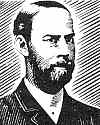|
A Radio Talk by Charles F. Kettering Radar is simply an abbreviation of the words "radio detection and ranging" which means finding the direction of an object and how far it is away. Its development depended on the measurement of a very high speed and a very short time. Nearly a hundred years ago a Frenchman - Fizeau, measured the speed of light. He found it to be 186,000 miles per second or a distance equal to seven times around the earth.  In
1886 Heinrich Hertz demonstrated
that what we call radio waves
had the same speed as light and could be reflected in the same manner.
Three years later Nikola Tesla
stated in an article that "By the use of
these waves we may produce an electrical effect from a sending station
and determine the position of a moving object, such as a vessel at
"sea." In
1886 Heinrich Hertz demonstrated
that what we call radio waves
had the same speed as light and could be reflected in the same manner.
Three years later Nikola Tesla
stated in an article that "By the use of
these waves we may produce an electrical effect from a sending station
and determine the position of a moving object, such as a vessel at
"sea."In the year 1922 Dr. A. H. Taylor and his associate L. C. Young, while conducting some communication experiments at the Naval Research Laboratory near Washington noticed a steamer in the Potomac interfered with their signals. In 1930, as a result of these experiments, the Director of the Naval Research Laboratory submitted a report to the Navy Department titled "Radio - Echo Signals from Moving Objects." |








